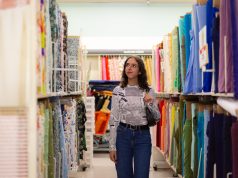Bella Epstein Seligsohn only sat to eat with her Holocaust survivor parents for Shabbat lunch on Saturdays. The rest of the week, they stood in the kitchen watching her and her sister.
For Seligsohn that was normal family life. Years later, she realized her parents only ate leftovers.
Seligsohn’s parents starved in Hitler’s death camps and didn’t want their daughters to ever go hungry.
“They wanted their children to live,” said Seligsohn. “They were very poor when they came here. They never ate until we were satisfied.”
Kalman Epstein and Regina Tondowska survived Hitler’s death camps. Epstein did slave labor in Auschwitz until the camp’s liberation in 1945. Tondowska took care of children in Theresienstadt, the last person to comfort them before they went to their deaths in the gas chambers.
The couple met in a displaced persons camp outside of Frankfurt after the war and married just before getting on the SS Marine Perch, the ship that took them to start a new life in New York City.
Only a year after their arrival, they had Bella and, three years later, her sister, Bluma.
Seven years after that, the family settled in a tenement at 103 Orchard St. on New York’s Lower East Side. That apartment is now part of a display at the Tenement Museum in New York City that shows how successive waves of immigrants lived a particular apartment. Seligsohn, a former Hollywood resident who now lives in California, helped recreate her family’s apartment for the exhibit.
The Lower East Side was a diverse neighborhood affordable for poor immigrants arriving in the city.
Seligsohn only had two dresses at a time: The one she wore and another in a closet she shared with her sister. The paint in the room the girls shared was chipped and a bowl of onions with oil and salt was a delicious meal.
Seligsohn washed her sister’s dirty diapers and her mother didn’t use sanitary napkins. They couldn’t afford them.
Her mother saved one sanitary napkin in the house for years for Seligsohn to use when she became a teenager.
“I didn’t know that wasn’t the way the world worked so to me it was the way the world worked. You have like one or two things,” said Seligsohn. “I had a very happy childhood. And then, later, I found out we were poor.”
In Auschwitz, Epstein did slave labor carrying rocks. On the Lower East Side, he worked carrying blocks of ice on his back to support his family. In the evenings, he worked in his uncle’s garment factory.
“He would take any job,” said Seligsohn. “Whatever it was that somebody offered him, he took. He didn’t care.”
Regina Epstein sewed in a clothing sweatshop. She worked during her pregnancy and Seligsohn remembers seeing her throw up and get back to work.
Even Seligsohn helped.
“I, too, had to work,” said Seligsohn. “At age 4, I would just stand in the street yelling ‘$1 a dress, $1 a dress!’ I’ll never forget that.”
Living in a shabby neighborhood was an adventure for Seligsohn.
“If you grow up not knowing there’s anything else out there, and your parents are loving and everything, and the streets are jumping all the time, for me, it was pretty much a wonderful childhood,” she said.
Despite working tough schedules to achieve the American dream and living in a cultural melting pot, the Epsteins remained Orthodox.
The sisters went to an all-girl Jewish school, the family observed Shabbat and Kalman Epstein prayed three times a day.
“To them, they were still living like in a little shtetl or something,” said Seligsohn, referring to the small Jewish villages in Eastern Europe.
“I didn’t know anybody more religious than we were,” she said.
Growing up on the Lower East Side, Seligsohn faced anti-Semitism
“We had an Italian girl living right under us and her mother didn’t let me play with her or we weren’t invited to their parties,” Seligsohn recalled. “She said to me, ‘You know why you weren’t invited? Because you are Jewish’ It didn’t bother me. I was Jewish, I was happy to be Jewish.”
Her parents never reciprocated their neighbors’ treatment.
“We were not like that, my parents have been through so much they were racist against nothing,” she said.
Seligsohn’s parents never talked about their time in concentration camps.
“They didn’t want their children to know their heartbreak,” said Seligsohn.
But, 15 years after her mother’s death, an aunt told Seligsohn she and her sister were their parents’ second family.
Kalman Epstein had a wife and a son. Regina Todoswa had also been married and had a baby. Both lost their spouses and children in the death camps.
“Both of them, I guess, longed for their first families. But they had to make a life here,” said Seligsohn.
Seligsohn, now 71, married Daniel Seligsohn and has three children and six grandchildren
“My parents made tremendous sacrifices,” said Seligsohn. “Once you get older, you also understand the sacrifices.”
Valentina Palm is a reporter in the Caplin News’s New York City Bureau.









































